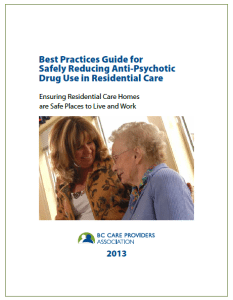
The BC Care Providers Association (BCCPA) announced today that it plans to release an updated version of its popular Best Practices Guide for Safely Reducing Anti-Psychotic Drug Use in Residential Care. The Guide has been the most popular downloaded document on the BCCPA website in both 2014 and 2015.
“Our membership clearly identified the issue of polypharmacy particularly reducing anti-psychotic drug use as something we could play a role in helping to address,” says Daniel Fontaine, CEO for the BC Care Providers Association. “That’s why in 2012 we began research into developing a one-of-a-kind frontline tool that could assist residential care providers to reduce the need for anti-psychotic medications.”
Although it may be appropriate for some seniors to take several drugs, the use of multiple medications, known as polypharmacy, increases the risks of drug interactions and side effects such as adverse drug reactions, adverse drug events, falls and hospitalization.
“Supporting health care providers in delivering person-centred care for people living with dementia is a key priority of the Alzheimer Society of B.C.,” says Maria Howard, CEO of the Alzheimer Society of B.C. “In partnership with SafeCare BC, the Society offers workshops to health care providers throughout the province to help develop their dementia knowledge and build valuable caregiving skills. The Society supports recent collaborative efforts and resources dedicated to ensuring antipsychotics are considered a last resort when caring for people living with dementia. It is positive to see these tools and strategies working together to address changed behaviours, which have often been addressed inappropriately by antipsychotics.”
In December 2011, British Columbia’s Ministry of Health released a report on the use of anti-psychotic drugs in BC residential care homes (the Report). The Report found that the use of anti-psychotic drugs has been increasing in residential care and that British Columbia had higher rates of use than other provinces. This increased usage is partially a result of the growing number of persons with dementia in residential care. In BC, the number of persons with dementia is estimated to increase 47 percent by 2026.
The 2013 edition of the Guide responds to the BC Ministry of Health’s Report by highlighting successful anti-psychotic drug reduction strategies implemented by seven BC residential care providers. Their strategies have safely minimized the https://bccare.ca/wp-content/uploads/2022/08/medcare-img22.jpgistration of anti-psychotics, benefiting persons with dementia, their families and care providers. Through these initiatives, BCCPA members are ensuring their residential care homes are safe and respectful places for both residents and staff.
“If you are a senior living in a residential care setting you expect that your doctor, nurse and care aides are working collaboratively to ensure they deliver the best possible health outcomes,” says Fontaine. “That’s why we are pleased to commit additional resources to gather and research the latest best practices from our members in order that they can be incorporated into an updated version of the Guide.”
Updated print copies of the guide will be distributed to all BCCPA member care homes throughout the province in spring 2017.
Background
- Polypharmacy increases risk for adverse drug reactions (ADRs), adverse drug events (ADEs), falls, hospitalization, mortality, and other adverse health outcomes among seniors. According to one study, 13% of seniors taking 5 or more prescription medications experience ADEs that required medical attention, compared with 6% of those taking 1 or 2 drugs. [1]
- Polypharmacy is also a well-known risk factor for increased morbidity and mortality, especially among elderly people, who are more likely to have comorbid conditions and thus be prescribed multiple medications. Older age is also a risk factor for ADEs, due in part to the exponential increase in potential drug interactions with a greater number of medications, but also because of age-related physiological changes that vary between individuals and can affect drug-handling by the body. These factors contribute to the large variability of medication effects in older patients.[2]
- Elderly people living in residential care homes can be at high risk for polypharmacy, since they are often frail and suffer from multiple illnesses. In particular, they are frequently prescribed preventive medications in accordance with best practice guidelines for individual chronic diseases. According to the Ministry of Health, residents in long term care in BC are prescribed an average of 9 medications, ranging between 1 to 42 (Ministry of Health, March 2013). [3]
[1] Deprescribing in Clinical Practice: Reducing Polypharmacy in Older Patients Linda Brookes. November 26, 2013. Accessed at: http://www.medscape.com/viewarticle/814861_2.
[2] Deprescribing medication for frail elderly patients in nursing homes: A survey of Vancouver family physicians. BCMJ, Vol. 56, No. 9, November 2014, page(s) 436-44. Accessed at: http://www.bcmj.org/articles/deprescribing-medication-frail-elderly-patients-nursing-homes-survey-vancouver-family-physi
[3] Deprescribing medication for frail elderly patients in nursing homes: A survey of Vancouver family physicians. BCMJ, Vol. 56, No. 9, November 2014, page(s) 436-44. Accessed at: http://www.bcmj.org/articles/deprescribing-medication-frail-elderly-patients-nursing-homes-survey-vancouver-family-physi




